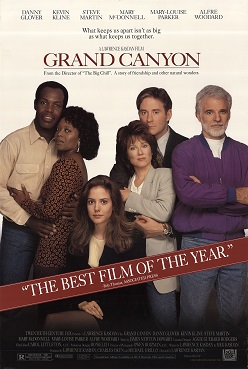| Grand Canyon | |
|---|---|
 Theatrical release poster | |
| Directed by | Lawrence Kasdan |
| Written by | Lawrence Kasdan Meg Kasdan |
| Produced by | Michael Grillo Lawrence Kasdan Charles Okun |
| Starring | |
| Cinematography | Owen Roizman |
| Edited by | Carol Littleton |
| Music by | James Newton Howard |
| Distributed by | 20th Century Fox |
Release date |
|
Running time | 137 minutes |
| Country | United States |
| Language | English |
| Box office | $40,991,329 (worldwide) [1] |
Grand Canyon is a 1991 American drama film directed and produced by Lawrence Kasdan, and written by Kasdan with his wife Meg. Featuring an ensemble cast, the film is about random events affecting a diverse group of people, exploring the race- and class-imposed chasms which separate members of the same community.
Contents
- Plot
- Cast
- Production
- Soundtrack
- Track listing
- Personnel
- Reception
- Box office
- Critical response
- Accolades
- Legacy
- See also
- References
- External links
The film was produced and distributed by 20th Century Fox and was released on Christmas Day, 1991. Grand Canyon was advertised as " The Big Chill for the '90s", in reference to an earlier Kasdan film.